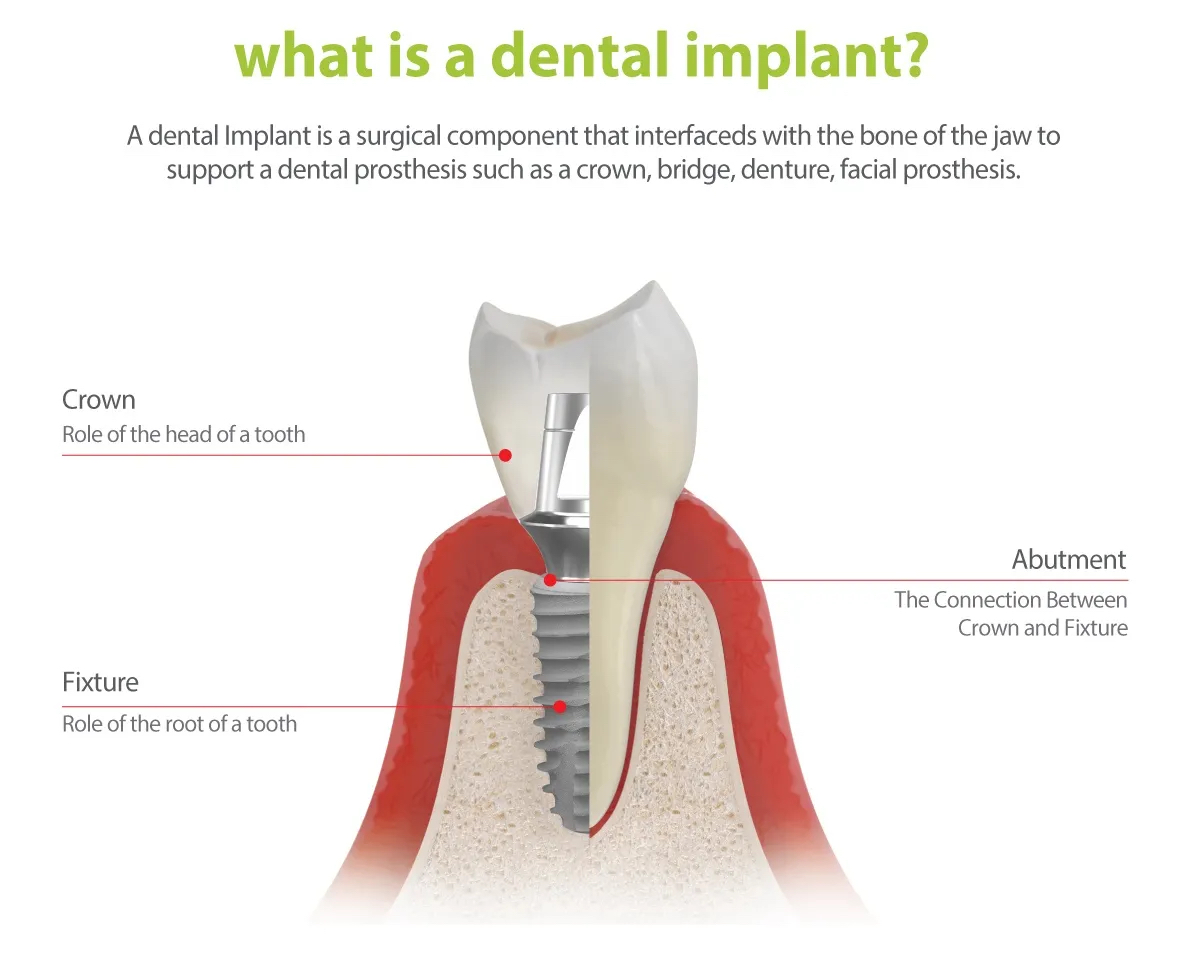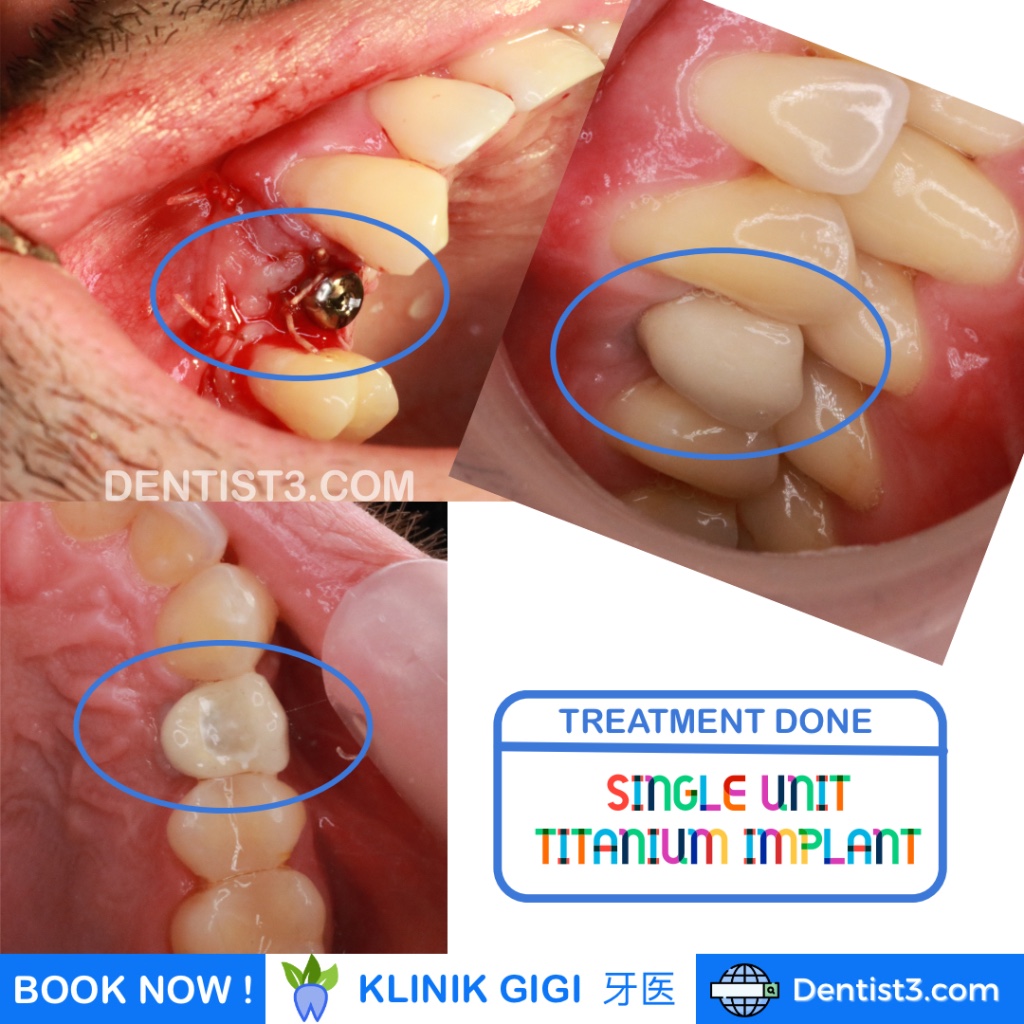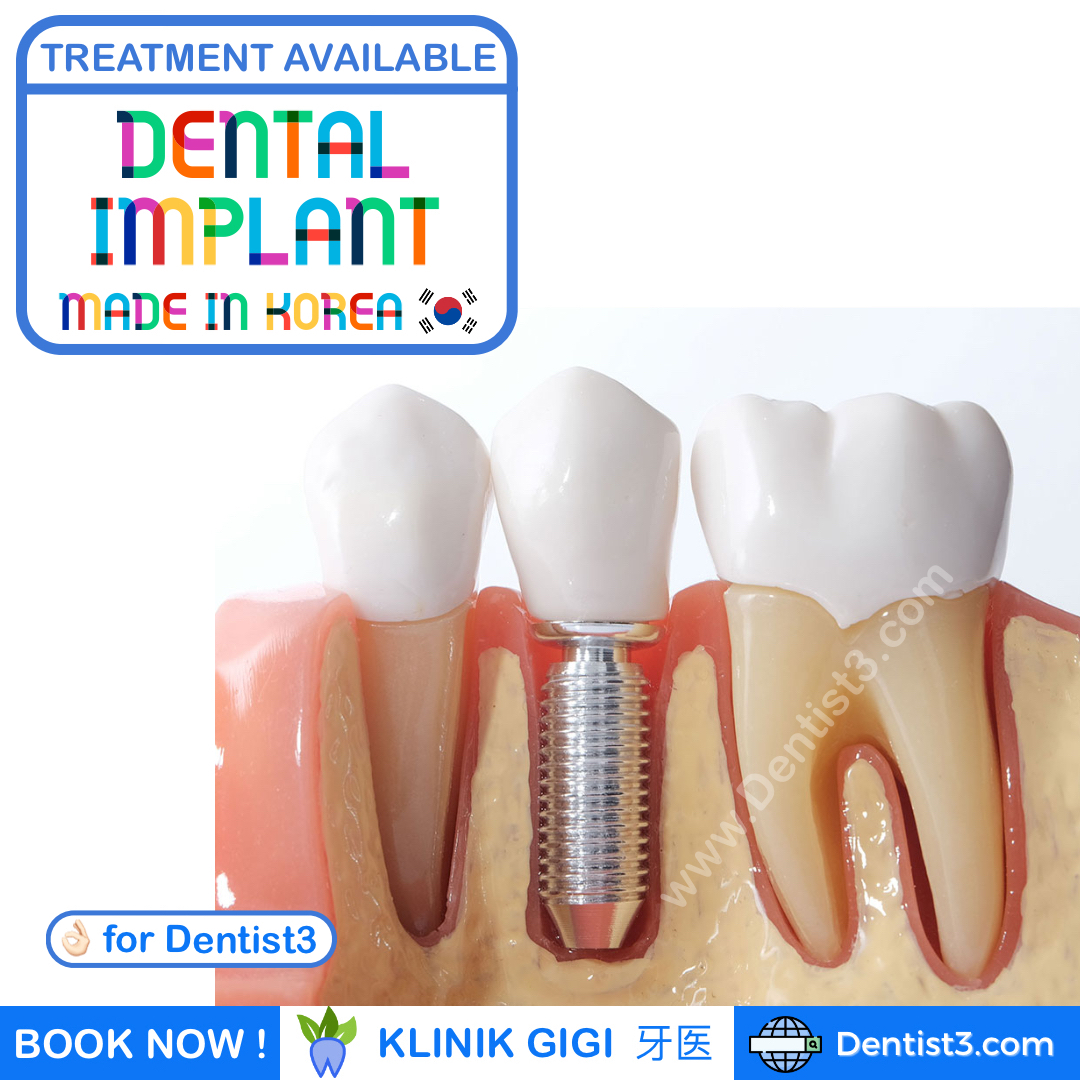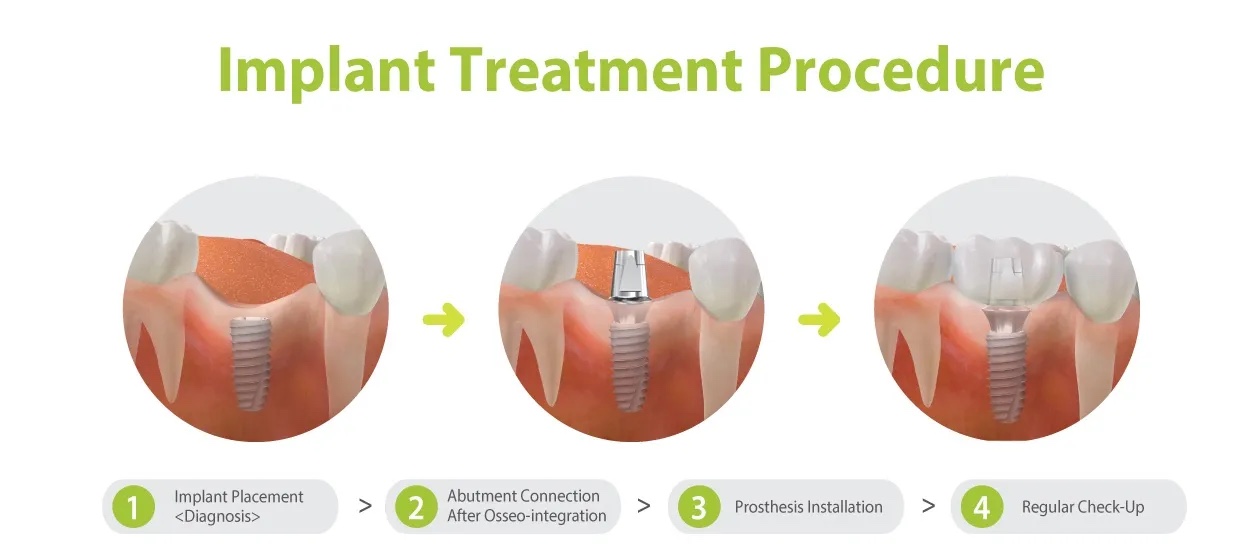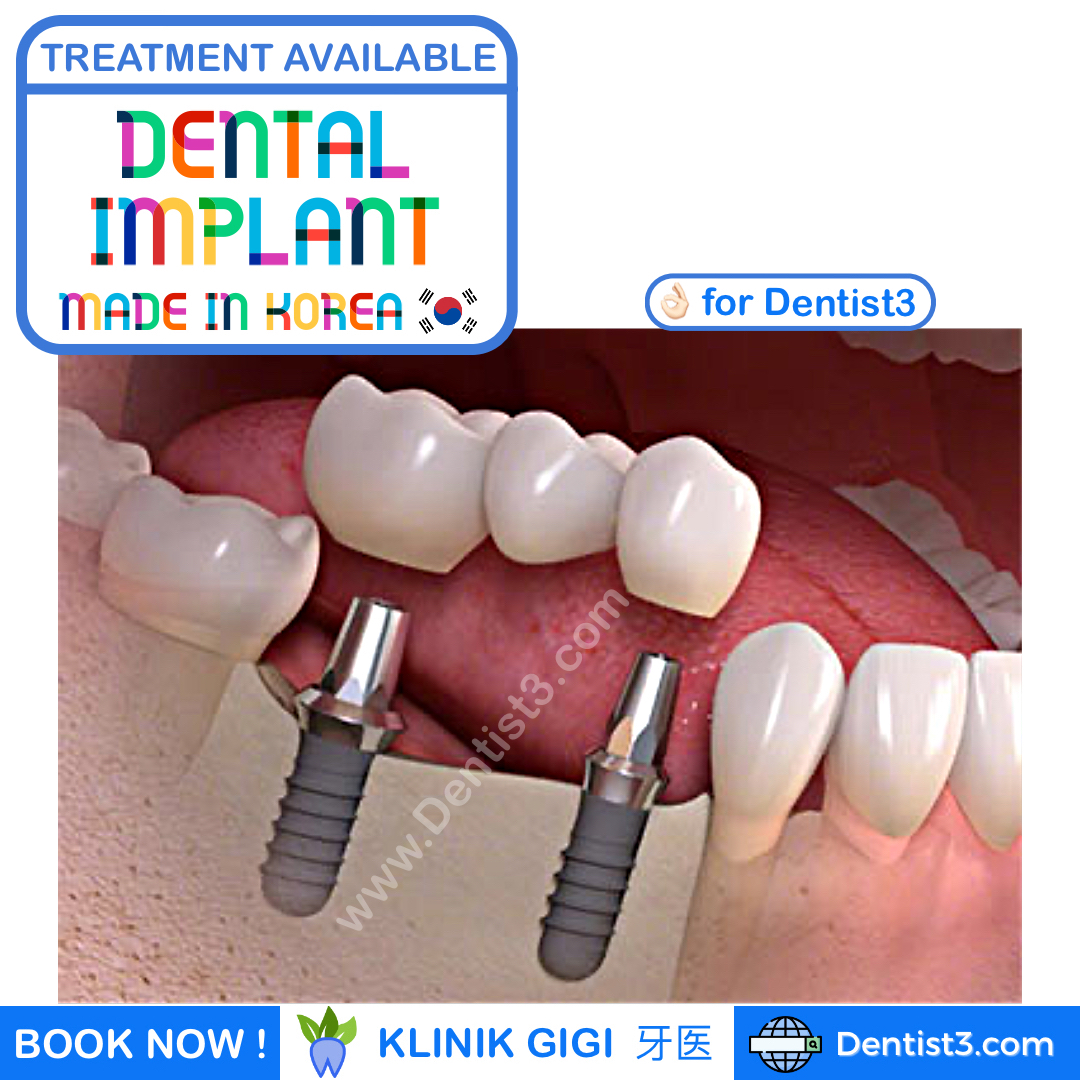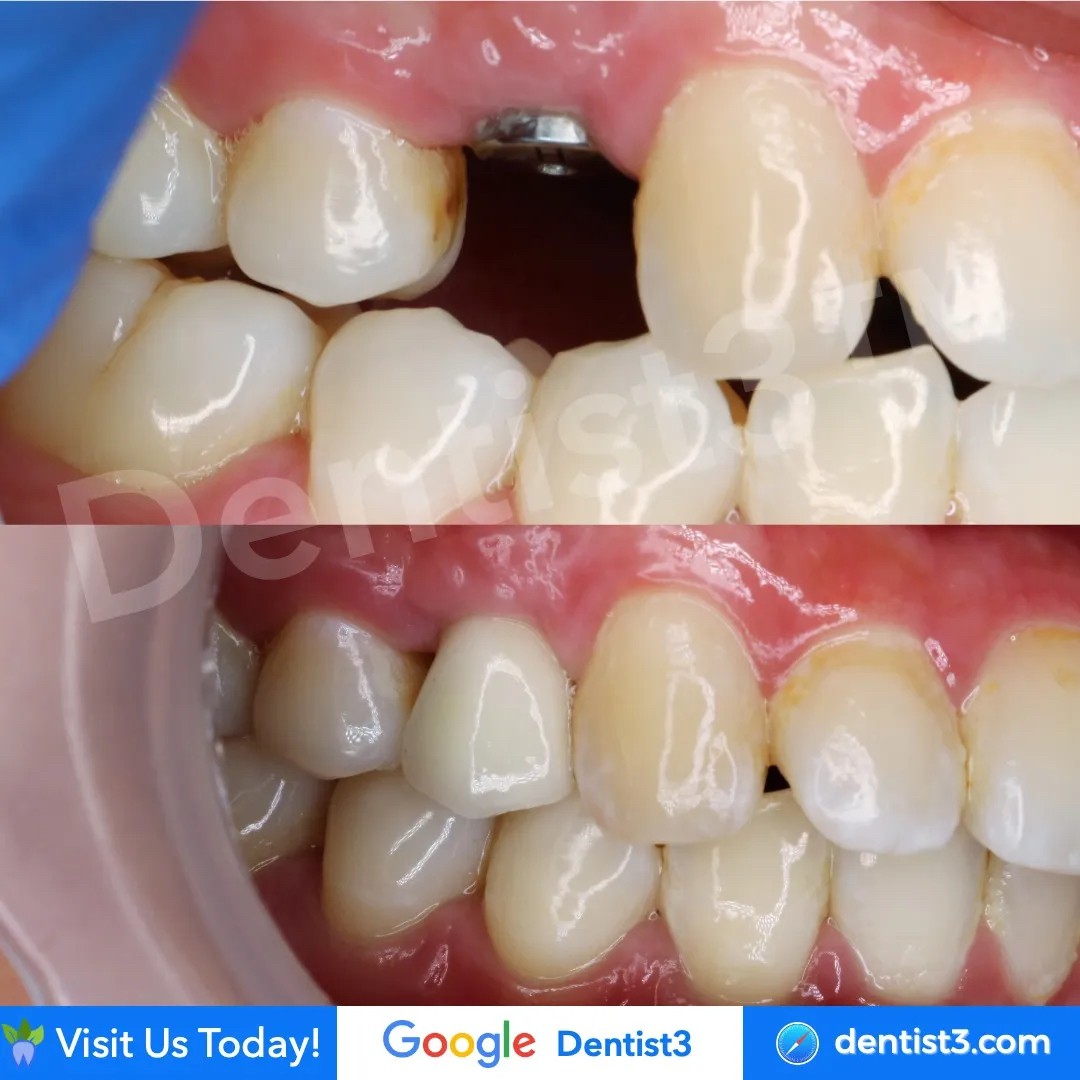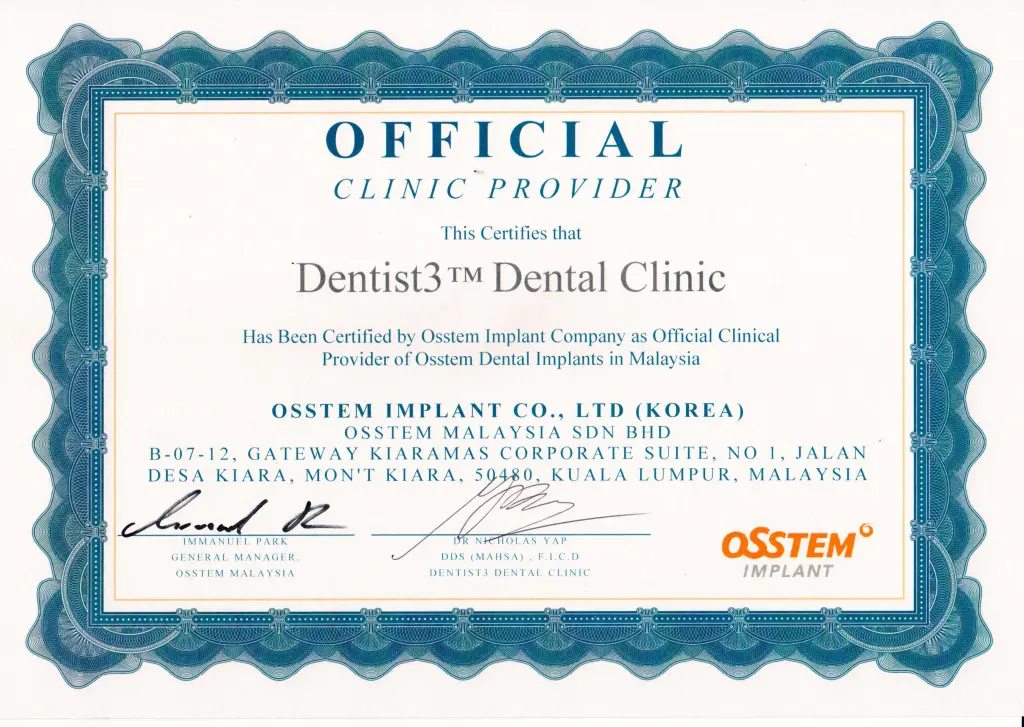Dental Implant Malaysia – Tanam Gigi . 种牙
Dentist3™ Clinics Uses Quality Dental Implants Imported from Korea
Webpage : https://dentist3.com/dental-implant-malaysia/
Dental Implant Careline : +60132348421
WhatsApp : https://linktr.ee/dentist3
Dental implants are used to replace missing teeth since mid 1950’s.It has gained increasing popularity in recent time due to its highly successful result and predictability.
It can be used to support crown as single missing tooth replacement, dental bridge that restore a larger span of missing teeth, or even to support loose denture. Dental implant is made of titanium metal, which is known to be compatible with our human body tissues and able to bond with adjacent bone during healing. Currently, there is large amount of evidence from clinical studies and scientific researches to demonstrate that dental implant is a safe and convenient way to replace missing teeth with natural-looking smile appearance.
Why choose dental implant?
Dental implant has many important advantages over conventional crown, bridge and denture:
-Dental Implant appears and feels like natural tooth.
-Dental Implant can chew in the same way as natural teeth with no difficulties with eating.
-Your healthy adjacent natural teeth do not have to be filed down to act as supports for the missing tooth or teeth. This means that they are therefore less likely to be weakened, painful and consequently need root canal treatment.
-Dental implant when integrated maintains the structure of the jawbone beneath the replaced tooth, as chewing forces are transmitted through the dental implant to the bone, stimulating the natural process of jawbone renewal. This helps preserve a good appearance, both of the restored teeth and of the face.
-Dental implant can be used to secure loose removable denture for better function.
-When dental implant is placed, there is no need to use denture adhesives or glues to hold the false teeth in place
Is the material used to make dental implant safe?
A dental implant is essentially a titanium metal screw, normally between 8 to 16 mm long, which is inserted into a prepared bony socket in the jaw. It will act as a replacement root for the missing tooth. A specially made titanium metal attachment called the abutment will be attached onto the implant, which forms the external connection for the new replacement tooth (crown) or teeth (bridge or denture).
During healing, the titanium surface of the implant fuses with the surrounding bone, in a process known as osseointegration, which can take about 3-6 months. After this time, the implant is sufficiently strong to support one or more false teeth.
Who can have an implant?
Dental implant is safe and suitable for almost anyone who has lost one or more teeth and would like to restore their appearance or chewing function. However, dental implant is not used in patients younger than 18 years of age due to their ongoing growth and bone maturation process.
To be a candidate for dental implant treatment, your mouth must be in a healthy condition, with no untreated tooth decay or active periodontal (gum) disease. If implants are fitted in the presence of active gum disease, there is high risk that an infection will develop around the dental implant that can lead to its failure and loss. Your implant dentist will need to improve your plaque control ability before treatment can be offered, because the long-term success of dental implant depends on good oral hygiene. After treatment is completed, you must attend regular follow-up and cleaning session every 4-6 months with your implant dentist; so that your oral hygiene can be maintained at healthy level to prevent any complications and to preserve the longevity of the implant.
If you meet all the criteria for implants above, your implant dentist will be confident to discuss the various treatment options that are available, which will take into account some of your personal factors such as your general health, the number and position of missing teeth, and the quantity and quality of your bone tissue.
What does implant treatment involve?
Clinical Examination Your dentist will conduct a thorough examination of your mouth and will take x-ray of your jaws to assess the shape and condition of your bone tissue and identify the locations of any important structures, such as nerves and sinuses, which may be close to the intended implantation site. This will allow the implant dentist to plan exactly how the implants will be placed. In a more complex situation, a computed tomography (CT) scan may be used to provide three-dimensional images, but this is a more costly procedure and exposes you to more radiation than standard radiographs. Thus, it will be only recommended when necessary.
Placement of the dental implant
Implant surgery can be carried out using either a one-stage or two-stage procedure, depending on your particular clinical circumstances. In either case, the surgery involves making a small incision in the gum to expose the bone and using a special drill to shape the implant site.
In the one-stage procedure, the implant is fitted into the prepared bone and then an attachment called a healing cap, which protrudes through the gum, is placed over it. This healing cap is removed after a 3-6 month period and replaced with a permanent attachment called the abutment, which takes the form of a post and core. The replacement tooth, or crown, is cemented in place over the abutment.
In the two-stage procedure, a cover screw is placed flush over the top of the implant and the gum is sewn up over it for the period of healing. A second procedure is needed to uncover the implant via a small incision in the gum and attach the healing cap. Then, after the gums have healed, the healing cap is removed and replaced by the abutment, in readiness for the new crown.
Your implant dentist will use his/her clinical judgment and experience to select the appropriate procedure for your implant therapy.
Dental implant impression
When your dental implant has fully healed (usually after healing period of 3 months), your dentist will take a new mould of your implant. This will be used to make a model of your teeth on which the dental technician will fabricate your implant crown or bridge, trying to achieve a natural finish that mimic the rest of your natural dentition.
Installation of crowns or bridges
When your new crowns and bridges have been fabricated, your implant dentist will cement or screw them on to the abutments over the dental implants, assess the appearance and fitting, and check that your upper and lower teeth work together comfortably when you bite. You will usually need to return for several clinical review sessions to make sure that the implants are stable and functioning appropriately, and that you are completely comfortable and pain free with the new implant prosthesis.
Dental Implant Malaysia – Tanam Gigi . 种牙
Dentist3™ Clinics Uses Quality Dental Implants Imported from Korea
Webpage : https://dentist3.com/dental-implant-malaysia/
Dental Implant Careline : +60132348421
WhatsApp : https://linktr.ee/dentist3
What is bone grafting and bone regeneration?
Bone grafts
Bone grafting procedure is performed to increase the width and height of the jawbone at the implant site. The best success can be achieved when bone from another part of your own mouth or body is used and this is known as autogenousgrafting. Typically, bone is harvested from inside the mouth, as it is a good source of marrow which contains many bone cells. Allograft is a graft that use donated human bone taken from a ‘bone bank’ and work in the same way as autogenous grafts but with lesser success rate. Xenograft is a procedure that use bone from an animal donor, with cows acting as the main source (bovine bone). The bovine bone in the graft is replaced by your own bone tissue over time. Alloplast is grafting that use synthetic bone substitutes that are chemically similar to human bone. These grafts act as a sort of framework for new natural bone formation and may be replaced by natural bone (resorbable alloplast) or retained (non-resorbable alloplast).
An autogenous graft is the preferred choice because there is absolutely no risk of your body rejecting it. After the procedure, you will need to allow appropriate healing for at least 3-6 months before having implants placed. The exact waiting time will depend how much bone has been grafted.
Bone regeneration using barrier membranes (guided tissue regeneration)
This is a special surgical method to enable bone cells an advantage over other types of cell to multiply and cover an area where bone loss has happened. Frequently, cells from the gum surface and the connective tissues multiply much faster at filling the gaps created by bone destruction compared with the bone cells and so bone may not have an opportunity to regenerate even when inflammation has been eliminated. In this procedure, the barrier membrane covers the area of bone loss and prevents access to it for the other cell types, giving the bone cells a better opportunity to fill in the defect. The barrier membrane may disintegrate and disappear over time (resorbable) or may need to be removed in a later procedure (non-resorbable).
How to make dental implant crown/bridge last?
Dental implants have been used successfully for many decades and we know that, with proper maintenance, they will function for many years. In many dental implant researches, 95% of implants last for more than 5 -10 years, but most are likely to have a much longer lifespan. To increase the longevity of your implant, you are strongly advised to avoid smoking and to continue with a very thorough oral hygiene program at home as well as to attend regular recall visits at your dentist for careful cleaning of your implant, teeth and gums. This will allow you to have your implant and teeth be professionally attended to and enable any problems to be dealt with immediately before they jeopardize the stability of your dental implant prosthesis.
With tip top personal oral hygiene, regular recall dental visits and avoidance of smoking, your dental implant has every chance of lasting for many years.
What can cause dental implant to fail?
Assuming there have been no complications with the healing process after dental implant insertion, the most likely cause of failure is inadequate personal oral hygiene care. If teeth are improperly clean, bacteria will build up on the implant surface and cause inflammation of the gum surrounding the implant – mucositis. If left untreated, this can worsen to a more serious stage called peri-implantitis, in which there is inflammation and bone loss around the dental implant. Eventually, the implant will lose its anchorage in the bone and becomes loose.
Are mucositis and peri-implantitis detectable and treatable?
It is not easy for you to detect when mucositis or peri-implantitis is present. Often, the only warning sign is an increased tendency for the gums to bleed during brushing and interdental cleaning. Some bleeding is expected during the healing phase after implant placement, but when bleeding occurs for prolonged period after implant restoration, it is a danger sign of underlying inflammation. Other noticeable changes are gum swellings, bad breath or a bad taste, oozing pus and loosening of the implant, bridge or dentures.
Regular recall appointments with your dentist will help ensure that any adverse changes are detected early so that peri-implantitis can be avoided. It is vital that you contact your implant dentist as soon as possible if you notice any signs of inflammation around your implant in between your scheduled dental visits.
The earlier the detection and treatment of mucositis and peri-implantitis, the better are the chances of prolonging the lifespan of your dental implant restoration
Dental Implant Malaysia – Tanam Gigi . 种牙
Dentist3™ Clinics Uses Quality Dental Implants Imported from Korea
Webpage : https://dentist3.com/dental-implant-malaysia/
Dental Implant Careline : +60132348421
WhatsApp : https://linktr.ee/dentist3
(ENGLISH) Dental Implant FAQ – Frequently asked questions
What is the success rate for dental implant surgery?
A: From 1975 to 2004, Implant success ranged between 90%mto 100% according to a clinical study. Reference) Immediate and early implant loading protocols : a literature review of clinical studies. J Prosthet Dent. 2005 Sep;94(3):242-58. Revi
How long is the Dental Implant Treatment Period ?
A: The treatment takes about one month from consultation up to the first surgery and another 2~3 months until the periodontal bones and implant are fixed firmly and the prosthesis is mounted. The period could be extended to 6~9 months depending on the condition of the jaw bones and mouth, your general health, chewing strength, and difference in the implant system.
Are Tooth Implants more expensive than Dentures?
A: Although the initial cost is high, implants are semi-permanent; thus, they are actually cheaper because no additional cost is incurred. In contrast, although the initial cost of dentures is lower than that of implant, additional cost may be incurred later.
Can Senior (Old / Geriatric) Patients undergo Tooth Implant Surgeries?
A: Yes & No. It all depends on the overall health and Oral health condition of the senior patient. Patients are usually advised to undergo implant surgery while they are still young because of the better bone condition, the bone volume, and the width and depth of bone where the implant will be placed. However, If initial consultation proves that surgery is possible with a high success rate, then elderly patients can undergo the surgery.
Does Dental (tooth) Implant Contain Harmful Metal Compositions?
A: No. Implant is made of titanium, forming TO2 on the surface in air, water, and other electrolyte by itself. Boasting of excellent bio-compatibility, implants are not harmful to the human body. The same material (Titanium) is also used in other medical implants during accidents and bone fractures.
What are the post-surgery (after treatment) effects or side effects?
A: After the surgery, your face or gums feel stiff and sore. Swelling may also cause the jaw or lips to be numb for several days. Still, there’s no need for you to worry; these symptoms will subside over time. You might also need to return to our clinic for follow ups to make sure that your implant is in good shape.
Can anyone get dental implants?
A: Most people are suitable candidate for getting dental implants if they are fit to undergo routine dental extraction or oral surgery. However, there are some pre-requisites in order to achieve optimized outcome from a dental implant. Patients must be ensured to have healthy gum and sufficient place of bone to support the dental implants. They also must be committed to good oral hygiene. Heavy smoker and people with chronic diseases should be evaluated carefully by our dentist for their candidacy.
How painful will dental implants cause?
A : Dental implant surgery is performed by making an incision in the gum, then the implant is embedded into the jawbone using a screw. Afterward, the incision in the gums is closed with stitches. However, it is unlikely to cause pain during the procedure as local anaesthetic will be used. In fact, it causes less pain than a tooth extraction.
How to take care of the dental implants?
A : You care for dental implants would be the same as you would do for your real teeth. The proper dental care includes brushing, flossing, rinsing with antibacterial mouthwash and regular dental check-ups. No special care is required for dental implant.
Are Tooth Implants more expensive than Dentures?
A: Although the initial cost is high, implants are semi-permanent; thus, they are actually cheaper because no additional cost is incurred. In contrast, although the initial cost of dentures is lower than that of implant, additional cost may be incurred later.
Can Senior (Old / Geriatric) Patients undergo Tooth Implant Surgeries?
A: Yes & No. It all depends on the overall health and Oral health condition of the senior patient. Patients are usually advised to undergo implant surgery while they are still young because of the better bone condition, the bone volume, and the width and depth of bone where the implant will be placed. However, If initial consultation proves that surgery is possible with a high success rate, then elderly patients can undergo the surgery.
Does Dental (tooth) Implant Contain Harmful Metal Compositions?
A: No. Implant is made of titanium, forming TO2 on the surface in air, water, and other electrolyte by itself. Boasting of excellent bio-compatibility, implants are not harmful to the human body. The same material (Titanium) is also used in other medical implants during accidents and bone fractures.
What are the post-surgery (after treatment) effects or side effects?
A: After the surgery, your face or gums feel stiff and sore. Swelling may also cause the jaw or lips to be numb for several days. Still, there’s no need for you to worry; these symptoms will subside over time. You might also need to return to our clinic for follow ups to make sure that your implant is in good shape.
Titanium Dental Implants: 种牙 . Dental “Tooth” Implants Malaysia – Tanam Gigi Malaysia
OSSTEM™Dental (tooth) Implant brand being used in Dentist3™ Dental Clinics
Dental implants are designed to replace your lost tooth without adjusting your existing teeth
Dentist3™ Clinics are using quality OSSTEM Dental Implants imported from Korea
Webpage : https://dentist3.com/dental-implant-malaysia/
Careline : +60132348421
WhatsApp : https://linktr.ee/dentist3
Dentist3™ Dental Implant Package Prices
From RM 4XXX onwards Per Implant Unit
“Quality & Affordable Tooth Replacement Dental Therapy“
(BAHASA MALAYSIA) F.A.Q extra!
⚫ Sesiapa je boleh dapatkan rawatan Implant ni ke?
🔩 Kebanyakan org yg cukup sihat utk buat rawatan seperti cabutan gigi atau surgeri oral, sesuai utk dapatkan rawatan Implant ni. Tapi ada beberapa syarat tertentu utk dapatkan hasil Implant yg terbaik.
Antaranya, patient mestilah miliki gusi yg sihat & tahap tulang yg cukup utk menyokong Implant. Korg perlu rajin jaga kebersihan mulut jugak. Perokok tegar & org yg ada penyakit kronik perlu diperiksa dgn teliti dulu oleh dr kami utk pastikan samada mereka betul2 sesuai atau tak utk dapatkan Implant.
⚪ Sakit ke buat Implant ni?
🔩 Surgeri Implant dilakukan dgn memotong bahagian gusi sikit, kemudian Implant akan ditanam ke dalam tulang rahang menggunakan skru. Lepas tu gusi akan dijahit. Siap! Biasanya takkan rasa apa2 masa prosedur sebab dr akan bius dulu. Malah, lagi tak sakit dibandingkan dgn cabutan gigi biasa.
🟤 Macam mana cara penjagaan Implant?
🔩 Cara penjagaan Implant sama je mcm jaga gigi asal. Perlu jaga dgn baik termasuk la gosok gigi, flossing, kumur dgn ubat kumur mulut antibakteria & pemeriksaan gigi berkala. Tak perlu penjagaan istimewa pun utk Implant ni👍🏻
Dental Implant Malaysia – Tanam Gigi . 种牙
Dentist3™ Clinics Uses Quality Dental Implants Imported from Korea
Dental Implant Careline : +60132348421
WhatsApp : https://linktr.ee/dentist3
Dentist3™ Dental Implant Package Prices
From RM 4XXX onwards Per Implant Unit
“Quality & Affordable Tooth Replacement Dental Therapy“
